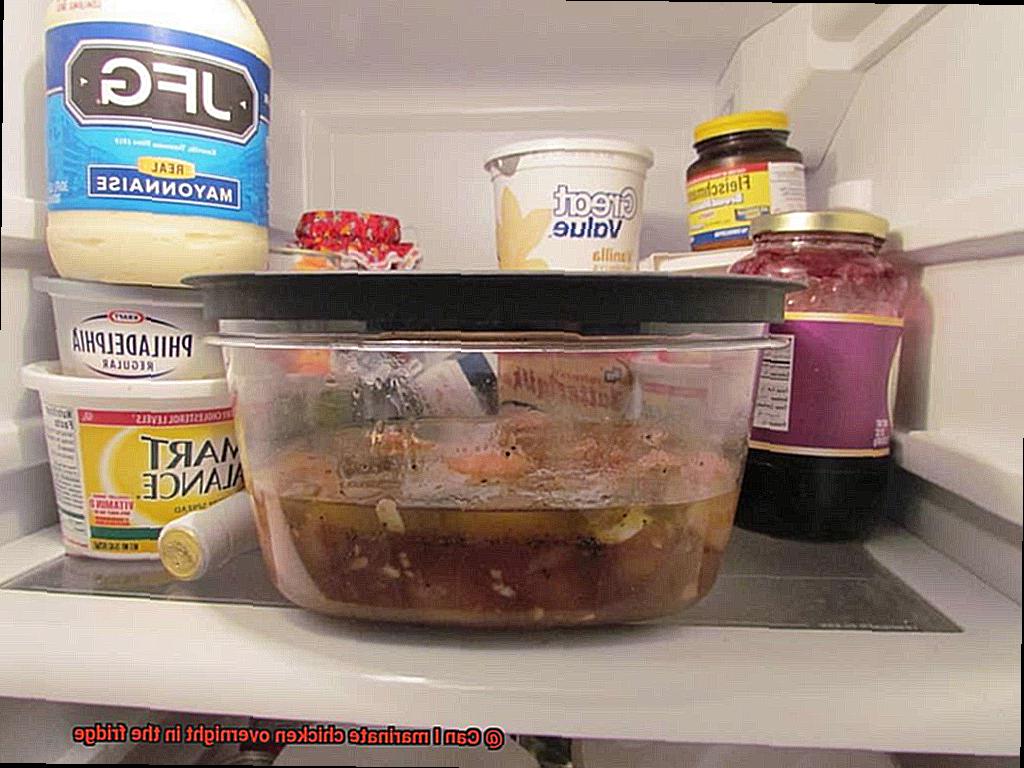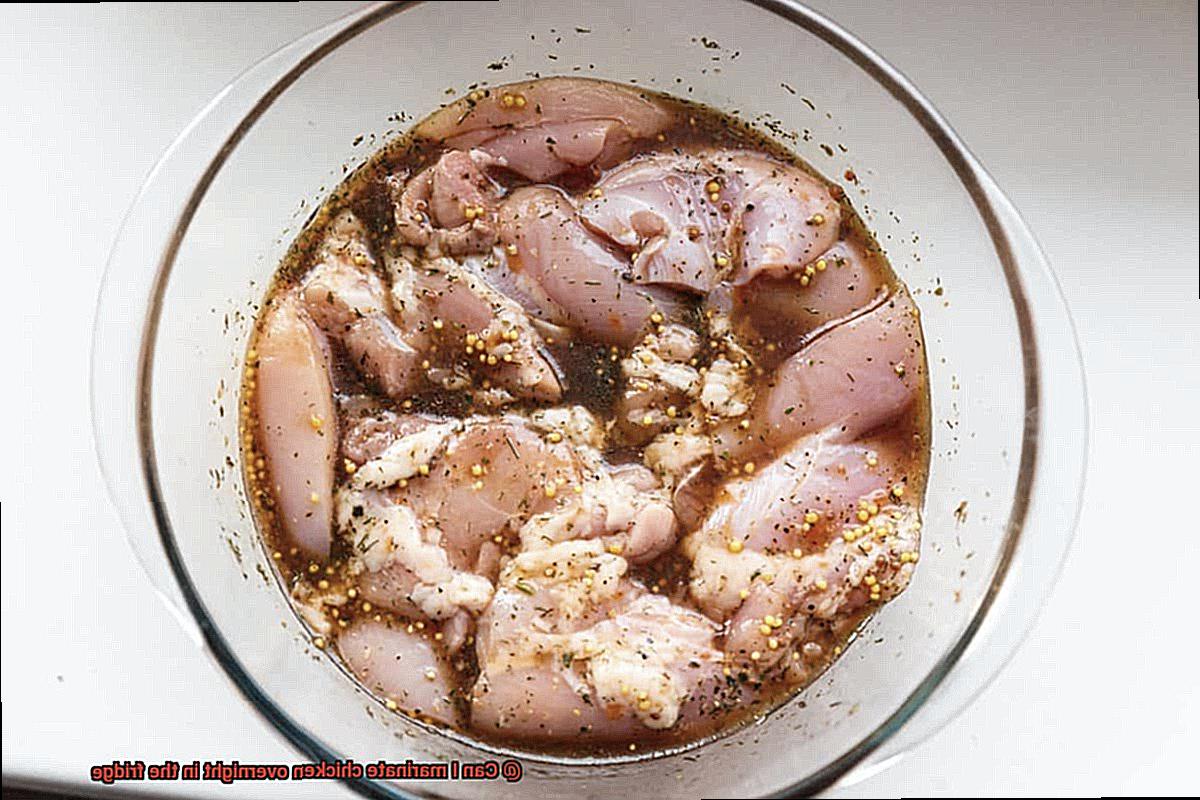Are you a chicken enthusiast who loves to get creative in the kitchen? Or are you a newbie cook curious about the best way to marinate chicken? Either way, you’re in for a treat. The age-old question of whether one can marinate chicken overnight in the fridge has puzzled many home cooks and chefs alike. Whether you’re planning a sizzling BBQ, an elaborate family dinner, or just craving a scrumptious meal, marinating is an excellent technique to infuse your chicken with flavor and tenderness.
But here’s the million-dollar question: Can you safely leave chicken in the fridge to marinate overnight without ruining it? Well, the answer is yes, but only if done correctly. In this post, we’ll delve into everything there is to know about marinating chicken overnight in the fridge. We’ll explore critical factors such as how long to marinade chicken, which ingredients work best, and what benefits come with marinating your poultry.
So if you’ve ever felt unsure about leaving your bird soaking overnight in the fridge, fear not. Keep reading and discover all the tips and tricks you need to create mouth-watering marinated chicken dishes for any occasion. Get ready for a flavor-packed adventure that will tantalize your taste buds like never before.
Contents
What is Marinating Chicken?
Marinating chicken is a culinary technique that involves immersing chicken in a mixture of various ingredients to create a delicious and tender dish. This process typically involves combining ingredients such as oil, vinegar, herbs, spices, and acid to create a flavorful marinade that will elevate the taste of the chicken.
One of the key benefits of marinating chicken is that it adds flavor without adding extra fat or calories. Additionally, the acid in the marinade helps to break down the proteins in the meat, making it more tender and easier to chew.
When marinating chicken, it’s important to choose the right type of container for the marinade. A glass or plastic container with a tight-fitting lid is ideal for marinating chicken overnight in the fridge. This allows the flavors to penetrate the meat more deeply, resulting in a more flavorful and tender dish.
It’s important to note that acidic marinades can react with metal, altering the taste of the chicken. So it’s best to use a non-reactive container like glass or plastic. When marinating chicken overnight, it’s also crucial to consider food safety. Raw chicken should always be kept at a temperature below 40°F to prevent bacteria growth.
To ensure that your marinated chicken is safe to eat, use your senses when determining if it’s ready. If the chicken has an odd odor or slimy texture, it should be discarded. Additionally, make sure it is cooked thoroughly until it reaches an internal temperature of 165°F to ensure that any bacteria has been killed.
Benefits of Marinating Chicken Overnight
The solution is simple – marinate your chicken overnight in the fridge. As an expert in the benefits of this technique, let me tell you that it’s like giving your chicken a luxurious spa treatment without breaking the bank.
Firstly, marinating chicken overnight allows the flavor to seep deep into the meat fibers, resulting in a more succulent and flavorsome chicken. The longer the marinade has to work its magic, the better. With a vast array of marinade options available, from classic Italian herbs to spicy Mexican seasonings, you can experiment with an endless variety of delicious flavors.
But it’s not just about taste – marinating chicken overnight can also help keep it moist while cooking. The salt and sugar in the marinade collaborate to retain moisture in the meat, preventing it from becoming dry during cooking. So whether you’re grilling, baking, or sautéing your chicken dish, you can rest assured that it will be juicy and appetizing.
Furthermore, marinating chicken overnight in the fridge can reduce the risk of bacterial contamination. The acidic components in the marinade help destroy bacteria on the surface of the meat, ensuring a safer and healthier meal for you and your loved ones.
To ensure optimal results when marinating chicken overnight, use a glass or plastic container with a tight-fitting lid to avoid any unpleasant reactions with metal. Always keep raw chicken below 40°F to prevent bacterial growth. Use your senses to determine if the chicken is ready – discard if it has an odd odor or slimy texture and cook thoroughly until it reaches an internal temperature of 165°F.
Safety Considerations for Marinating Chicken Overnight
Marinating chicken overnight in the fridge can be a game-changer for your dinner plans. The flavors infuse, the meat becomes tender and juicy, and your taste buds are in for a treat. But before you start marinating away, let’s talk about the safety considerations you need to keep in mind.
Firstly, let’s address the elephant in the room – raw chicken is a potential host for harmful bacteria such as Salmonella and Campylobacter. To avoid any cross-contamination, it’s crucial to handle raw chicken with care. Use separate cutting boards, utensils, and containers for raw chicken, and wash your hands thoroughly with soap and warm water before and after handling it. These simple steps can go a long way in preventing food poisoning.
Next up, let’s talk temperature. The FDA recommends keeping raw chicken at 40°F or below to prevent bacterial growth. This is why it’s important to use a leak-proof container or a resealable plastic bag when marinating chicken overnight – to prevent any juices or marinade from leaking onto other foods in the fridge. Keeping the chicken at a safe temperature is non-negotiable when it comes to food safety.

Thirdly, let’s consider the duration of marination. While it might be tempting to let your chicken soak up all those flavors for days on end, it’s best not to marinate chicken for more than 24 hours in the fridge. Marinating it for too long can break down the proteins, making it mushy while also increasing the risk of bacterial growth. If you need to marinate chicken for more than 24 hours, do so in the freezer instead.
Lastly, cooking the marinated chicken thoroughly is essential. Make sure that the internal temperature of the cooked chicken reaches 165°F to kill any harmful bacteria that may be present. And here’s a pro tip – never reuse marinade that has been in contact with raw chicken unless you bring it to a boil first to kill any bacteria. This simple step can make all the difference in ensuring food safety.
How to Select the Right Container for Marinating Chicken
Marinating chicken is a great way to add some extra flavor to your meals. However, the container you choose for marinating chicken is just as important as the marinade itself. Here are some helpful tips to keep in mind when selecting the right container for marinating chicken:
Non-Reactive Containers
Choosing a non-reactive container is essential when marinating chicken. Acidic marinades, like those with citrus juice, vinegar, or wine, can react with metal containers and alter the flavor of the chicken. So, it’s best to go for glass, ceramic, or stainless steel containers that won’t react with acidic ingredients.
Size Matters
It’s important to choose a container that is big enough to hold all the chicken pieces without overcrowding them. Overcrowding can prevent the chicken from being evenly coated in the marinade and can also increase the risk of bacterial growth. Make sure there’s enough space for each piece of chicken to be fully submerged in the marinade.
Lid it Up
A tight-fitting lid on your container helps keep your chicken fresh and prevents air from getting in. This is important because exposure to air can cause the chicken to dry out and become tough. Alternatively, you can use a resealable plastic bag that can be squeezed to remove any excess air before sealing.
Cleanliness is Key
Before adding the chicken to the container, make sure to clean it thoroughly with soap and hot water. This helps prevent cross-contamination and reduces the risk of foodborne illness. Also, make sure to wash your hands thoroughly before handling raw chicken.
Shallow and Wide
When selecting a container for marinating chicken, a shallow and wide container is better than a deep and narrow one. This allows the chicken to be fully submerged in the marinade, ensuring maximum flavor absorption. Plus, it makes it easier to flip the chicken pieces during marination.
Safety First
Always practice proper food safety when marinating chicken overnight in the fridge. Make sure that the chicken is fully covered with marinade and stored in a sealed container. Discard any leftover marinade as it may contain harmful bacteria from the raw chicken.
What Temperature Should I Keep My Fridge At?
The ideal temperature range for your fridge is between 35-38 degrees Fahrenheit (1.6-3.3 degrees Celsius). This sweet spot helps to slow down the growth of bacteria and keep your food fresh for a longer time.
Why is it so important to keep your fridge at this temperature? If your fridge is too warm, it can lead to harmful bacterial growth that can cause foodborne illness. Conversely, if it’s too cold, it can freeze your food and ruin its texture and flavor. Therefore, maintaining a consistent and optimal temperature is critical for both food safety and quality.
To ensure that your fridge is at the correct temperature, you should use a thermometer to check it regularly. Simply place the thermometer in a glass of water and leave it in your fridge for several hours to get an accurate reading.
Another tip to maintain the proper temperature in your fridge is to avoid overloading it. When there’s not enough space between items in your fridge, it can cause the temperature to rise. Therefore, make sure there’s enough room for proper air circulation and keep an eye on how much you’re putting into your fridge.
In summary, keeping your fridge between 35-38 degrees Fahrenheit (1.6-3.3 degrees Celsius) is essential for food safety and quality. Here are some quick tips to remember:
- Use a thermometer to check the temperature regularly
- Avoid overloading your fridge
- Make sure there’s enough space between items for proper air circulation
How to Know if Marinated Chicken is Safe To Eat?
Marinating chicken is a popular way to add flavor and tenderness to this beloved protein. However, improper handling and storage of marinated chicken can lead to foodborne illnesses such as salmonella and E. coli. To ensure that your marinated chicken is safe to eat, it’s important to follow these guidelines:
Proper Storage:
Storing marinated chicken at the right temperature is crucial for preventing bacterial growth. Keep the chicken at a temperature below 40°F in a sealed container or plastic bag to prevent cross-contamination with other foods. This will also help keep the chicken fresh and tasty.
Check Expiration Dates:
Always check the expiration date of all ingredients used in the marinade. Using expired ingredients can spoil the marinade and lead to bacterial growth on the chicken. It’s also important to avoid using marinades that contain raw eggs or dairy products as they can cause food poisoning.
Cook Thoroughly:
Cooking marinated chicken thoroughly is necessary to ensure it is safe to eat. The internal temperature of cooked chicken should reach 165°F to kill any harmful bacteria that may be present. Use a meat thermometer to check the temperature and avoid cutting into the chicken to check for doneness as this can cause loss of juices and flavor.
Use Your Senses:
Your senses are an important tool in determining if marinated chicken is safe to eat. If the chicken has a sour or off smell, slimy texture, or unusual color, it’s best to discard it immediately. These are signs of spoilage and indicate that harmful bacteria may be present.
Prevent Cross-Contamination:
When marinating chicken, it’s essential to prevent cross-contamination by using separate utensils and containers for raw chicken and any other ingredients. This will prevent any bacteria from spreading to other foods and keep your kitchen clean.
How to Cook Marinated Chicken Properly?

Marinating chicken is a fantastic way to add flavor and tenderness to this versatile protein. However, cooking marinated chicken properly is just as important as the marination process itself. With these tips, you can ensure that your marinated chicken is cooked safely and deliciously.
Bring the Chicken to Room Temperature before Cooking

Before cooking marinated chicken, make sure to take it out of the fridge at least 30 minutes ahead of time. This will help the chicken cook evenly and prevent it from being dry.
Use a Meat Thermometer
To ensure that your marinated chicken is safe to eat, use a meat thermometer to check its internal temperature. The USDA recommends cooking chicken to an internal temperature of 165°F (74°C) to kill any bacteria that may have grown during the marination process.
Choose Your Cooking Method
There are many ways to cook marinated chicken, but grilling and baking are two of the most popular methods. If you’re grilling, preheat the grill to medium-high heat and lightly oil the grates. If you’re baking, preheat your oven to 375°F (190°C) and place the chicken onto a baking sheet.
Let the Chicken Rest after Cooking
Once your marinated chicken has finished cooking, let it rest for a few minutes before cutting into it. This allows the juices to redistribute throughout the meat, resulting in a juicier and more flavorful chicken.
Follow Recipe or Marinade Instructions Carefully
Different marinades may require different cooking times or methods, so be sure to follow any specific instructions provided in the recipe or marinade instructions.
ppuXHNnYziw” >
Conclusion
In conclusion, marinating chicken overnight in the fridge can elevate your meal game to new heights. The process allows the flavors to penetrate the meat, resulting in a succulent and appetizing dish that will leave your taste buds dancing with joy. However, it’s crucial to prioritize food safety when handling raw chicken. Always use non-reactive containers, keep the chicken at a temperature below 40°F, and cook it thoroughly until it reaches an internal temperature of 165°F.
Apart from enhancing flavor, marinating chicken overnight has several benefits that go beyond taste. It helps keep the meat moist while cooking and reduces the risk of bacterial contamination. The possibilities are endless when it comes to marinade options – from tangy teriyaki to zesty lemon pepper – so feel free to experiment with different flavors.
Choosing the right container is just as important as selecting a marinade when preparing chicken. Use non-reactive containers that are spacious enough to accommodate all the pieces without overcrowding them. Ensure each piece is fully submerged in the marinade and practice proper food safety at all times.
Cooking marinated chicken correctly is equally vital for a delicious outcome. Bring the chicken to room temperature before cooking, use a meat thermometer to check its internal temperature, choose your cooking method carefully, let it rest after cooking, and follow recipe or marinade instructions closely.
With these tips and tricks in mind, you can create delectable marinated chicken dishes that will tantalize your taste buds like never before.






